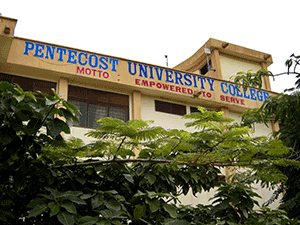Nigerians have been going abroad for tertiary education since colonial times.
Herbert Macauley, Nnamdi Azikiwe, Mbonu Ojike, Michael Okpara, Obafemi Awolowo, Tai Solarin, Atanda Fatai-Williams, Bolaji Akinyemi, Tafawa Balewa, Ahmadu Bello, all studied abroad.
Some even fell in love on campus and brought back wives.
Pentecost University, Ghana
In the past, Nigerians studied overseas mainly because there were no universities at home or the few available did not have sufficient student capacity.
The first higher institution of learning in Nigeria, Yaba College of Technology (Yabatech), was established in 1948, the same year University College, Ibadan (UCI) was founded, which became a full fledged University of Ibadan (UI) 1962.
In the present, however, reasons vary for preferring university education abroad, especially in Europe and America, despite the high cost.
Fees per session range between £10,000 and £20,000 in the United Kingdom, $10,000 and $40,000 in the United States, and between $10,000 and $20,000 in Canada.
170m population, few universities
Data on the website of the National University Commission (NUC) show that Nigeria currently has a total 129 universities – federal (40), state (39), private (50).
This number is grossly inadequate for a country with a population of 170 million and a growing middle class with a huge appetite for higher education, a status symbol and ticket for a good meal.
By comparison, Japan has a population of 126 million but has 778 universities – national (86), public (95), and private (597).
However, the inadequate number of universities is not the only reason Nigerians seek education on the other side of the world.
Some said they could not put up with the low quality in the country’s ivory towers, others cited unsuccessful attempts to gain admission.
For yet others, the prestige attached to a foreign degree is the pull. They believe that a foreign degree will get them better job opportunities in a Nigeria steep in unemployment.
Those who do not have the resources to travel overseas attend an international school whose parent campus is abroad.
There is limited space in local universities, where 1.4 million candidates compete for about 300,000 slots yearly, there are frequent disruptions in academic programme through strikes, inadequate facilities, and a money-for-grade culture.
A study conducted by researchers in Ambrose Alli University, Ekpoma and Auchi Polytechnic (both in Edo State) showed that out of the number of candidates who apply for tertiary education nationwide every year, only 15.3 per cent get admission. Meaning that 84.7 per cent are left out.
Everything better abroad
Given the high demand and limited supply in Nigeria, going abroad becomes inevitable. There are 18,000 Nigerian students in the UK and 8,000 in the U.S.
Countries such as China, India, Australia, Benin Republic, Ghana, South Africa, Dubai, and South Africa also have an influx of Nigerian students.
Indeed, there is no country in the world where there are no Nigerians schooling, employed, or doing business.
Jane Nassi, who studies at the Pentecost University College, Ghana, said she stayed at home for two years without getting admission into a Nigerian university.
Bode Akinola, who graduated from Houdegbe North American University in the Republic of Benin in 2009, recounted that he waited at home for three years for a direct entry into a Nigerian university without success.
To beat the 30-year age limit for participation in the National Youth Service Corps (NYSC), he took options outside the country and, having already obtained a diploma, completed his degree in two years.
Students said the standard of education abroad is better and, in some countries, fees are lower compared with charges in private universities in Nigeria which start from N500,000 per session.
Akinola paid N150,000 per session at Houdegbe North American University, which has a large number of Nigerian students.
He said the school is organised, well equipped, has structured timetables and diligent lecturers, some of them Nigerians.
Fear of low quality Nigerian degree
Pentecost University College, Ghana charges N250,000 per session.
Waziri Damilola, a 200 level student of information technology at the university, said his experience in a private university in Nigeria made him to go abroad.
He was studying computer engineering in the private university (name withheld) but had no practical experience throughout his first year.
Unlike in the past – when the quality of education in Nigeria was comparable to that of any country anywhere in the world and graduates of Nigerian universities ranked among the best globally – these days, a Nigerian degree is hardly worth the paper it is written on.
The fear of a certificate obtained in Nigeria not being recognised elsewhere contributes to the flight.
Add to that the hassle of scaling the post University Matriculation Examination (UTME) final screening for admission. Students complained that the UTME is fraught with fraud and a lack of transparency.
Oyewusi Suliat, a student at Pentecostal University in Ghana, narrated that she went overseas after waiting unsuccessfully for a place in a Nigerian university.
Even if one gains admission in Nigeria, disruption through strike by lecturers or protest by students increase both the number of years spent in school and the cost.
High fees, bribe for grade
Besides, lecturers in Nigerian universities demand bribe – in cash or kind – to give grades or approve projects on campuses that also brim with other forms of corruption, as well as tribalism, favouritism, cult activities, and poor quality.
The quality of university education in Nigeria has been dwindling since the mid 1980s, yet fees have been increasing, even in federal and state universities.
Earlier this month, Governor Babatunde Fashola, fearing electoral consequences, announced a return of fees at the Lagos State University (LASU) to the original N25,000 per session because of students’ protest.
The students had protested against the hike in fees of between N170,000 and N350,000.
“If I have to pay this much at LASU, why not go to Ghana?” a student wondered.














